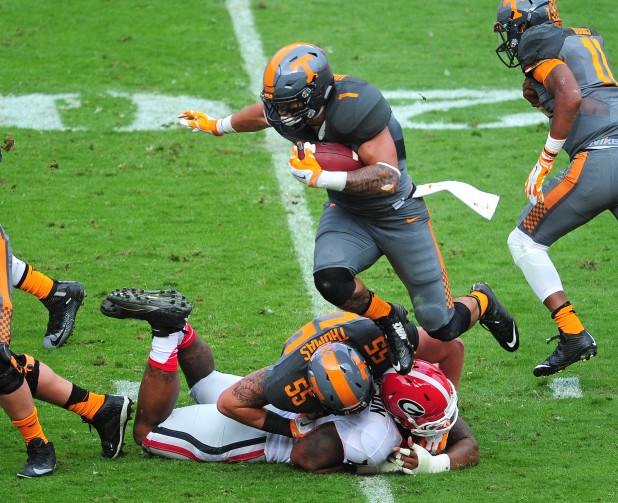Butch Jones gained a win he desperately needed.
Mark Richt lost most if not all of his remaining margin for error in this SEC season.
Florida gained some leverage.
Tennessee enjoyed a delicious serving of role reversal.
That last detail underscores the nature not just of Saturday’s win over Georgia, but of this SEC season as a whole. If you briefly stop to consider the trajectory of the 2015 SEC campaign, you will quickly see that role reversal is a rather common occurrence — not just here and there, but in many cases week to week.
Arkansas squandered a late lead against Texas A&M but then overcame a two-touchdown deficit to beat Tennessee last weekend. The Vols, stung not just by that collapse but also their fourth-quarter disaster against Florida a week earlier, managed to transform themselves into comeback artists this time. The psychology of sports is endlessly fascinating, in that some teams and solo athletes handle the pressure of playing with a lead or an advantage in the standings, while other teams and athletes don’t. Some teams need to be behind (Gary Danielson mentioned this during Saturday’s broadcast, in fact) so that they’re playing with an urgency which is absent when the scoreboard happens to be favorable.
Sure, teams shouldn’t need to play from behind in order to be at their best, but the psychology of sports is such that some athletes — either in team or individual contexts — need to face scoreboard adversity in order to play well all the time. Tennessee has a long way to go in terms of becoming a complete team, one which can win in all circumstances, but the Vols undeniably played their best second half of the season on Saturday to beat Georgia.
This turnabout by Tennessee against Georgia, and the about-face by Arkansas on Oct. 3 which gave rise to the Vols’ resurrection seven days later, are hardly the only instances of role reversal in the 2015 SEC.
On Sept. 19, Kentucky was the team which couldn’t finish drives or consolidate any momentum in a scratchy 14-9 loss to Florida. One week later, on Sept. 26, the Wildcats owned the leverage, and Missouri was the team which couldn’t sustain any kind of offensive potency. The Wildcats, living on the other side of the divide, prevailed by a 21-13 count.
We’ve seen Ole Miss — not in an eight-day span, but still quite clearly — play the role of the hammer on one occasion (at Alabama) and get nailed in another instance (at Florida). We’ve seen Alabama take one on the chin while imploding at home (versus Ole Miss), and then dish out a beatdown as a road team (at Georgia last weekend).
Keep in mind that most of the really big games in the conference — Florida-Georgia in the East, and then the boatload of divisional games in the SEC West, starting with Alabama-Texas A&M next Saturday — have not yet been played.
This dynamic — one week you’re the windshield, the next week you’re the bug — has certainly existed in other conferences, so it’s not exactly unique to the SEC. Nevertheless, it’s striking how this conference, which used to be defined by a top-heavy quality (think of Alabama and Florida fending off all challengers in 2008 and 2009, and Alabama/LSU/Georgia standing tall in 2011 and 2012), is so much more fluid right now.
We’re still waiting for stasis and stability to enter the 2015 SEC season. If fluctuations continue to enter the picture, without any sort of calming trend, we’re going to have a two-loss SEC champion… which means no guarantees for an SEC team in the College Football Playoff.
*
Tennessee’s win over Georgia might not have decided anything in the SEC East. However, it certainly shifts even more pressure to Florida. We’ll see how the Gators handle their nighttime test at Missouri, and — for that matter — the rest of their season. Beyond the East, though, the Vols’ win over the Bulldogs reinforces what we’ve seen the past month in the SEC. The character of the conference, as much as its individual weekly results, will have a lot to say about the nature of the playoff chase come late November.
